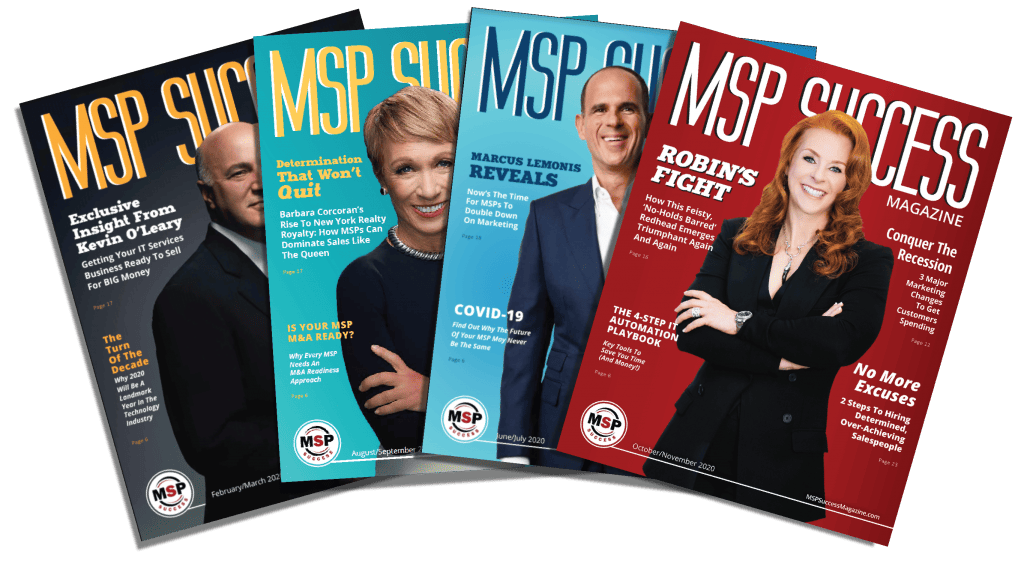Global entrepreneur Jeff Hoffman knows how to scale a company. The founder of multiple companies and author of “Scale,” Hoffman has been involved in startups that include Priceline.com/Booking.com, uBid.com, and ColorJar. During a recent Technology Marketing Toolkit Producers Club meeting, Jeff talked with MSPs about what he used to scale eight companies he started with a half a dozen people into global companies and even became multibillion-dollar companies. Looking back on the mistakes he made, he shared the things that worked and helped him turn his companies into industry dominating successes.
Hoffman’s Biggest Lessons Learned
Get Out Of The Way
Hoffman invented the kiosks at the airport where you check yourself in. When he started a company to make them, he was offered some investment money. But when he was asked for the company bank account and legal company name, neither of which he had set up, he quickly realized he didn’t know a lot about running a company. “That day I thought, what else do I not know how to do?” Hoffman confessed. “I don’t know how to hire. I don’t know finance. The list of things that you are good at is maybe one. It turns out I have never hired an engineer who also did my taxes and wrote all our marketing copy. It’s not the way the world works.”
When Hoffman realized he should focus on the one thing he was best at and hire smarter people than himself for every other area of the company, that’s when his company started to grow. “You can’t scale until you can get out of the way,” Hoffman said. “It amazes me how many people come to me and say, ‘Jeff, I’m working harder than I ever have. I’m putting in more hours than ever, and I’m not growing faster.’ The problem is that YOU putting in more time running the business is not the solution. Building a team to grow your business is where a chunk of your time should be spent. Being able to trust and empower and grow a team is the key to make your business really grow and take off. And the key to that is surrounding yourself with people smarter than you.”
Hire Quality Over Quantity
Rather than hiring a higher quantity of people, it’s more productive to invest more money in hiring better quality people which Hoffman refers to as “rock stars.” “A valuable lesson I learned is if I have enough money to hire five people, instead of hiring five average people, I’ll spend all that money on two rock stars and they will far outperform 10 average people,” Hoffman said. “You can’t build greatness on the backs of average people. Rock stars make companies, average people don’t, so stop focusing on the number of people you hire and spend your money on the quality of people you hire.”
Overcompensate — Don’t Be Greedy
Don’t be penny-wise and pound-foolish. Hoffman pays his rock star employees above the industry compensation scale. He also offers every employee equity in his companies, including the receptionist. The return on his investment is far greater than the extra money he pays. Hoffman found a systems engineer named Bill who everybody on his team wanted him to hire. But for Bill to switch jobs, he wanted a raise of $10,000.
Rather than give Bill a $10,000 raise to come work for him, Hoffman offered him $15,000 and told Bill he thought he was worth it. All of Hoffman’s friends thought he’d wasted $5,000 because Bill was happy with a $10,000 raise. Hoffman disagreed. Every day when Hoffman went to leave work, he’d see Bill hard at work. Hoffman would always tell Bill to go home and every day, Bill would say he’d go home as soon as he was finished. Hoffman said, “One day I asked, ’Finish what?’ Bill said, ‘Finish proving that you were right to believe in me.’” Hoffman added, “I got an employee who was determined to prove that he was worth that extra $5,000.”
Not only did Bill work harder than the average employee, but when Hoffman also needed to hire four more engineers, Bill offered to handle finding them. This saved Hoffman headhunter fees, money from not having to run ads, and the time it would have taken his team to interview and filter people. “Who do you think the friends of rock star engineers are?” Hoffman asked. “Other rock star engineers. The next four people I hired came from Bill’s network, and it cost me $0 because he told his friends, ‘I work for a guy who focuses on what you’re worth, not what the salary scale says out there.’ People are looking at these salary scales, and they’re trying to get people for less, and I’m spending a little more on rock stars and we’re crushing all the competition because all the best people want to work here.”
Go Find Rock Stars
Build time into your schedule to devote to finding rock star employees and building a team. These are people who are smarter than you and that everyone wants to hire. “The most talented people, the rock stars, aren’t going to wander into your office and ask you to hire them,” Hoffman said. “You have to hunt down talent and look for rock stars.” Hoffman devoted one to two days every month to what he called “talent hunt day.” He put himself in situations where he was surrounded by the best of the best. When he needed a human resource professional, he attended a conference in Dallas for the Society of Human Resources Managers (SHRM) with 1,200 human resources managers in attendance. “The lunch speaker was Angela,” Hoffman said. “She was winning the HR Executive of the Year award for the United States.” Initially, she turned his job offer down saying that everyone in the room had offered her a job and she already had a good job. “She said, ‘Why would I come work for you?’ and I said, ‘Because you’d own a piece of the company.’” Angela ran HR for Hoffman for his next four companies.
Follow The Servant Leadership Model
The way to get and keep a rock star employee is to take really good care of them. “Focus on what you can do for your team, not what they can do for you,” he said. Hoffman spends part of his week serving his team and doing things for them. For example, if people work through lunch, he always buys them lunch. “People want to compare the cost of a sandwich to the value of a rock star’s extra hour at work,” Hoffman said. “People always talk about the cost. They never talk about the gain. The benefit, the amount I invested in lunch when they didn’t leave the office, came back to me massively because that rock star was on a roll and never got up and broke their concentration. I make money on their expertise.
So, if they want to skip lunch, I’ll gladly pay for that.” For Hoffman, it went well beyond buying lunch. After hiring a young rock star developer, Hoffman walked in the room where the rock star was working and asked if anyone needed anything. Having never met Hoffman, the new rock star innocently asked if Hoffman could pick up his dry-cleaning, which Hoffman proceeded to do. Mistakenly thinking Hoffman was mad, Hoffman’s two vice presidents ran out of the building after him, apologizing and begging Hoffman not to fire the young man. “I said, ‘I’m not mad. I left the building to pick up that kid’s dry-cleaning. That kid is the most brilliant designer I’ve ever seen. That product is going to triple our revenues. Not only am I going to pick up that kid’s laundry, but if you guys need me this afternoon, I will be outside washing that kid’s car.’”
The product the young man developed won the Internet Commerce Exposition (ICE) Award. “We got the best new tech product in the country at the Internet awards that year,” Hoffman said. “That kid designed it, not me. THAT is how you build success.”
Attract Rock Stars By Asking Them About Their Vision
Hoffman had zero voluntary turnover. He attributes that to changing the way he interviewed prospective employees. Rather than following the traditional interview model of telling people about his vision and mission statement, he starts every interview by asking them, “What is something you need to do with your life to make it a success?” After asking the question to an engineer named Chris, he discovered that Chris wanted to buy his mom a house in Florida that was fully paid off, and that would make his life a success.
Curious about such a specific answer, Hoffman discovered that Chris had grown up extremely poor, living in a rusted-out Airstream with holes in the side where snow would blow in during the winter. With only one blanket for his mom, sister, and him to share, Chris recalled watching his mom and sister shiver all night. “I asked him, ‘How did you get through that?’” Hoffman said. “He said, ‘Because I vowed every single night that one day I will work hard enough and be successful enough to buy my mom a house in Florida, all expenses paid, so she can spend the rest of her life in comfort and warmth as a thank-you for the sacrifice she made to be my mom.’ I said, ‘Chris, you’re hired.’” Later, when the business wasn’t going well, Chris helped Hoffman figure out how to fix the company, despite it not being his job to do so.
Chris said, “I’m going to stay here and help you. This isn’t about me. This is about my mom and I’m not leaving until we fix this company because my mom’s future depends on it,’” Hoffman said. “He was determined. It wasn’t about a paycheck. It was about something bigger. People driven by passion and purpose far outperform people driven by paychecks.” Hoffman asked every employee to share what their reason was for coming to work and put pictures up on the walls that depicted their visions of success. (For example, Chris’ picture was of a house.) Hoffman was able to sell that company far sooner than he’d imagined and when he did, every employee got a cut because every employee had equity. Chris was able to buy a fully furnished home for his mom in Florida and surprised her with it — and Hoffman was even there to witness her reaction. After selling the company, when employees were asked why they never quit, they said, “Because we’ve never worked at a place where our mission was also your mission. You told us straight up that you want our career here to be a path to our success, not yours.”
Design Yourself Out Of A Job
The goal is to have a team so talented and empowered that there are no problems. The day Hoffman realized that was the day he walked in and had nothing to do. At first, Hoffman felt sad until his team told him: “Every phase of the company is working. Sales is crushing it. Ops is crushing it. Product, crushing it. We don’t need you right now. You hired the best people. You trust us, you empowered us, and we’re killing it.” Half-jokingly, Hoffman asked if he was fired. “They said, ‘You’re promoted. We want you to go back to being chief dreamer,’” Hoffman recalled. “I realized then I had it backward. I thought I was important when my phone rang. But if you’re a really good manager, your phone doesn’t ring when you’re at the beach because the company is so well-designed, and your people are so talented and empowered that nobody needs you anymore.”
Build A Culture Of Values
Build a company where the best people in the industry all want to work for you and never want to leave. After realizing his job assignment was not to run the company but to build a place everyone wanted to work, he started what he calls “culture days.” “I started asking people, ‘How do I make this the best job you’ve ever worked at?’” Hoffman said. “I told them straight up. ‘I want this to be a company you never want to leave. What do I need to do?’” He found that while rock stars care about money, it’s not the most important thing. His companies had a big charity component to it. He also provided experiences for employees such as taking his tech people on a business trip with him to Europe where they didn’t have to work. The sole purpose was to give employees an international experience. “Rock stars can get a job anywhere because they’re a rock star. They care about experience, impact and a set of values. All these things matter.”
Build A Culture From A Set Of Values Your Employees Can Get Behind
Hoffman’s culture was built from the values of his employees. Employees were asked to make a list of everything any boss ever did that made them hate their job. They also made a list of anything any boss ever did that made them love their job. Hoffman incorporated their answers into a new employee manual. “It’s not rocket science,” Hoffman said. “If you do anything on the left side of the sheet, you’re fired. And on the right side of the sheet, when you become a manager, do that stuff for other people, because you just told me that’s why you loved your job that you had before. That is how we built that culture.” Hoffman used these values to hire people, too. “Could somebody meet a person at your company and say, she’s totally one of us or he is not one of us?” Hoffman asked. “If you can’t define what one of us is, you don’t have a culture. A culture is a set of values that drive behavior that allow people to say, ‘He’s one of us,’ or ‘She’s not one of us.’ That’s not a job description. That’s a culture.”
Post Your Culture On The Wall
Your culture should be visible everywhere and written on the wall. Employees were not fired for making mistakes, but they were fired for violating values. This didn’t just apply to employees. Hoffman turned down multimillion-dollar deals because the business didn’t align with his values.
“What you don’t want is somebody saying, ‘I didn’t know that was important,’” Hoffman said. “If it’s a value, it’s on the wall. Build a culture. Even if you are a one-person company, start noting what you care about and what your culture is and start defining the answer to this question.”
Make A Habit Of Info-Sponging Every Day
Your daily habits matter. Just like the best professional athletes practice every day, Hoffman practices at being a better businessperson. To make sure he is constantly innovating and staying ahead of his competition, he schedules time to do what he calls “info-sponging” where he looks at things outside of his own industry. “I noticed the really successful people take time to see what the rest of the world is doing,” Hoffman said. “They scheduled a few minutes each day to actually pick up shiny objects. I challenge myself to learn one new thing every day that I don’t need to know. It’s not in my industry.” Hoffman challenged the audience to schedule 10 or 15 minutes once a week — or daily, like he does — where you pretend you don’t work for your industry. He chooses things that look interesting or make him curious.
The goal is to learn one new thing you don’t even know why you’re learning about and then write down one sentence about it. For example, he read a story about selling distressed inventory and wrote down the sentence, “Distressed inventory requires a shielded pricing channel.” Another day he read about selling bananas. His sentence had to do with selling perishable commodities. “Think of every piece of knowledge you acquire like a puzzle piece,” Hoffman said. He says by collecting the puzzle pieces and moving them around each day, you can study patterns and figure out what the pieces make.
“What happened one day was we’re in Connecticut putting all these pieces together,” Hoffman said, “and what came out of that was a distressed inventory, perishable commodity yield management-driven sales system. Today, that is a company called Priceline.com and it’s worth $98 billion.” The most important thing is that you can’t scale a company by yourself. Hoffman won because he found rock stars he trusted, then he empowered them to make decisions for his company.
Spend time finding rock stars and building a team of them. Create a network for when you need it by having conversations with people and assessing them everywhere you go. By learning their story, you might just find a person you want on your team one day. When you hire people, find out what their vision is for an epic life, then focus on how you can help them get it. Lead them by serving and don’t be greedy. Build a culture of values and post it on your walls. Follow your curiosity and trust your gut as you search to see what the rest of the world is doing, then be the first to bring it to your industry. Do these things and you’ll crush your competition, scale your business, and win in life and business.
To watch Jeff’s video on attracting top talent, go to https://mspsuccess.com/hoffman















